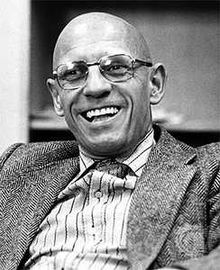Part of my difficulty in Part 1 and this post was that I originally loved Foucault and Goffman. At least, at the superficial level as a used-for-past-research acquaintance. I got what they were saying at the introductory level and believed it. In today’s reality-tv obsessed programming, I agreed with those two: in essence, BIG BROTHER IS WATCHING.
I guess I still love those two old pals of mine. But, the game-changer was my reading from Feminism/Postmodernism and the critique on Foucault (which I suppose can be applied to Goffman).
“Big Brother is watching” — this is the idea of power being everywhere and nowhere at the same time. We hold it in the sense of controlling everyone’s actions, yet that omniscience we hold is both almighty, and meaningless at the same time. Quite simply, it means something because we make it mean something. I work part-time in retail where there are cameras. Knowing that corporate has much better things to do than sit and watch me all day makes me think that I don’t have to care as much. However, knowing that my actions are archived changes my mind in doing something out of line. Even the possibility knowing that someone just might decide to do a random check-in via satellite and watch me in real-time. All these possibilities keep me in line. I do get borrowed in another location, where the store is much smaller, and there are no cameras. Knowing this when I go there, I would think I would let loose a little, but I don’t.
Why? It all goes back to performance and the panopticon. The employees at that store all have their own standards, so I have to maintain that. In addition, they know that my standards are always tested being on camera, so I’m under scrutiny to not make mistakes or be useless.
This got me wondering about gender dynamics, relations, and identity: how do these narratives, scripts, schemas, play out as a performance?
Hartsock in the Feminism/Postmodernism reader specifically critiques Foucault that while he has “…obvious sympathy for those who are subjugated in various ways, he writes from the perspective of the dominator, ‘the self-proclaimed majority'” (165). Hartsock also points out the complexities and controversies of the politics of recognition as, “…power relations are less visible to those who are in a position to dominate others” (165). Thus, how valid are some of his theories to apply for someone who is marginalized? Hartsock also points out that Foucault suggests that those in the margins are accountable for their own actions which sounds a lot like blaming the victim.
Going back to Part 1, I mentioned that through the years growing up, I chose to act as one-of-the-boys, as well as dismissed my ethnic culture so as not to appear too “off the boat fobby”. Yet, my WordPress blog Gravatar and my Facebook profile picture is a picture of Sailor Mars…very ironically iconic and symbolic of my Asian identity. I also will point out that being once young, I admittedly have posted suggestive ‘girly’ photos of myself while intoxicated, scantily clad and so forth. In fact, those pictures are still up on my profile. Whether it’s for my ego, or whether I choose to embrace my silly youthful mistakes, or whether I just don’t care to upkeep my profile, that is a whole topic I dare a psychologist to analyze and tell me what they think.
The question I am trying to get at here is this: are we really perpetuating a cycle of our identities based on what others expect of us? I like to think I do things for myself, but the rude awakening of reality has told me that I put way too much effort in thinking if you all will approve of every move I make first. It’s all apparently very silently and internally calculated, then channeled. And somehow, I believe my actions are authentic, but perhaps it’s more contrived than I’d like.
